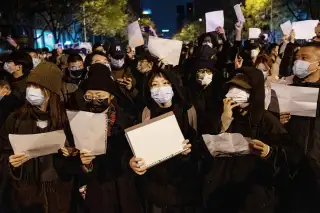What Investors Should Do as Protests in China Rattle Global Markets

Investors are worried about China again.
A swift uptick in Covid-19 cases has triggered a slew of new lockdowns and restrictions — a rapid reversal from the potential reopening that Chinese workers and global investors alike have been eagerly anticipating. Over the weekend, large-scale protests against China’s strict zero-Covid policy intensified in several cities including Beijing and Shanghai.
Global markets tumbled on Monday as investors digested the news of both the new restrictions and the potential for ongoing protests. Hong Kong’s Hang Seng Index fell nearly 1.6%, while London’s FTSE 100 Index closed 0.2% lower on Monday.
U.S. markets didn’t escape unscathed either: The S&P 500 closed 1.5% lower on Monday afternoon, while the Dow Jones Industrial Average closed more than 1.4% lower.
Because China is one of the world’s biggest consumers of raw materials, prices of commodities like copper, oil and coal have also fallen sharply.
“Concerns over weaker energy demand from China, the world’s largest oil importer, contributed to a 2.9% fall in the price of Brent crude, which has now fallen more than 17% since its recent peak earlier this month,” UBS Global Wealth Management Chief Investment Officer Mark Haefele wrote in a research note Monday.
What do the protests in China mean for markets?
Some experts are worried that both the growing civil unrest and the new government restrictions will weigh on economic activity and delay a full reopening of the Chinese economy. This is especially concerning given the threat of a global recession and persistently high inflation.
And it's already happening, to an extent: Amid ongoing shortages at a key manufacturing facility in Zhengzhou, for instance, Apple is reportedly facing a shortfall of 6 million iPhone Pro cell phone units. The tech giant’s stock was down 2% on Monday afternoon. The production delay demonstrates “that everyone, even Apple, is susceptible to supply-chain constraints in China due to Covid,” Anshel Sag of Moor Insights & Strategy told Bloomberg News.
Others say that the wide-ranging effects of the protests won’t be as extreme. For markets outside of commodities and specific supply chains like Apple, experts at Bespoke Investment Group say they expect the impact of the chaos in China to be “relatively small and short-lived.”
That’s because Chinese markets are “poorly integrated into the rest of the world,” the analysts wrote. “Chinese consumers purchase little from the rest of the world [with the notable exception of commodities], but supply much.”
What can investors expect next?
For now, it’s not yet clear what will happen — but risks remain. Over the weekend, analysts from Goldman Sachs estimated that the likelihood of China’s economy reopening before the second quarter of next year is 30%.
It’s still an “open question as to whether Beijing will ease the restrictions associated with the zero-Covid policy so that the economy can begin to expand," says Quincy Krosby, chief global strategist at LPL Financial.
It would take a massive vaccination effort to help create an economy that could reopen despite the ongoing risks associated with Covid, he added, which would “help restore conviction in China’s markets.”
What should investors do in the meantime?
Financial advisors tend to recommend that long-term investors try not to focus on short-term market moves. In other words, worries about the situation in China should not prompt you to make major changes to your investment strategy. Trying to time the market is not a good strategy, and that’s especially true where unpredictable geopolitical events are concerned.
However, market disruptions like this can be a good time to review your portfolio allocations, especially since investing in an emerging market like China can come with different risks — and different opportunities — than investing in U.S. stocks.
"Any occurrence in China should affect your way of thinking about any investment in China," says Kevin Philip, a partner at Bel Air Investment Advisors. That's worth keeping in mind when you determine how much Chinese exposure your portfolio will have.
More from Money:
Why Investing Experts Are Saying 2023 Could Be a Rough Year for the Stock Market
Why It's So Important to Keep Investing When Stocks Are Down
The Fed May Slow Down Its Rate Hikes, But Investors Shouldn’t Celebrate Yet